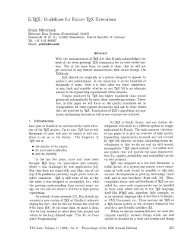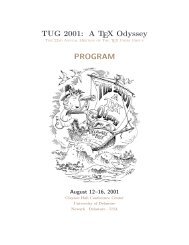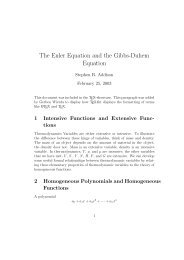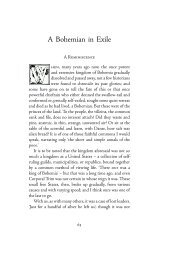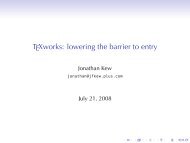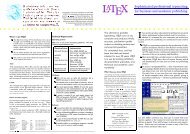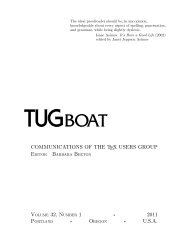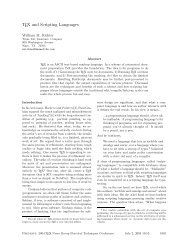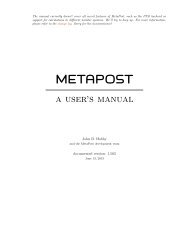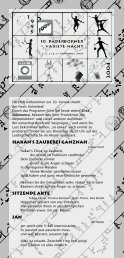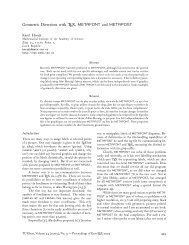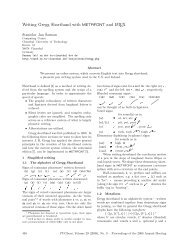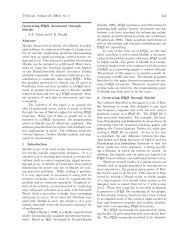Complete issue 10:1 as one pdf - TUG
Complete issue 10:1 as one pdf - TUG
Complete issue 10:1 as one pdf - TUG
You also want an ePaper? Increase the reach of your titles
YUMPU automatically turns print PDFs into web optimized ePapers that Google loves.
<strong>TUG</strong>boat, Volume <strong>10</strong> (1989), No. 1 15<br />
previous version.) What happens next depends on<br />
the chosen editor.<br />
For TPU, a scratch file is created and the contents<br />
of any initialisation file copied to it. Commands<br />
are added to position the cursor at the place<br />
where spotted the error. The scratch file is then<br />
used <strong>as</strong> the TPU initialisation file. After exiting the<br />
editor, this scratch file is deleted.<br />
The process for EDT is similar: an initialisation<br />
file specified via TEX$EDIT-INIT is copied to a<br />
scratch file which is used to initialise EDT. However.<br />
it is not possible to position the cursor exactly at<br />
the err<strong>one</strong>ous text automatically (EDT is somewhat<br />
lacking in this respect), only to the right line. So the<br />
command sequence GOLD M is defined, which can be<br />
used to position the column correctly by hand.<br />
Since both TPU and EDT are callable, but only<br />
<strong>one</strong> can be used in a particular session, it is<br />
obviously somewhat inefficient to have both permanently<br />
linked (they are both quite large). Fortunately,<br />
both editors are implemented <strong>as</strong> sharable<br />
images. This allows to determine which editor<br />
to use via TEX$EDIT, then load the appropriate<br />
sharable image using the run-time library routine<br />
LIB$FIND-IMAGE-SYMBOL before invoking the editor.<br />
With the possible exception of LSE, which is<br />
TPU-b<strong>as</strong>ed but not available to the author, the other<br />
DEC editors are not callable, and must be invoked,<br />
<strong>as</strong> would a non-DEC editor, by spawning a DCL<br />
command. Of the non-callable editors, only TECO<br />
can position the cursor in its initialisation file. However,<br />
input to TECO is split into pages (i.e., TECO<br />
makes a single p<strong>as</strong>s through the file with a buffer<br />
of finite capacity), so it is not wise to position the<br />
cursor automatically. Instead, a macro is defined in<br />
q-register '1' to perform the positioning.<br />
Any other editor is executed with a fixed sequence<br />
of command line arguments, separated by<br />
spaces: the file to be edited; the err<strong>one</strong>ous line;<br />
the err<strong>one</strong>ous column; and the initialisation file (if<br />
any). This allows a DCL procedure to be specified<br />
<strong>as</strong> TEX$EDIT, permitting editor-specific processing.<br />
For example, the trivial procedure for use with SOS<br />
would be:<br />
$ DEFINE/USER SYS$INPUT SYS$COMMAND:<br />
$ sos 'PI'<br />
The change file and editor-specific code<br />
for T@C 2.95 can be obtained by contacting<br />
the author at either alienQuk.ac.essex.ese or<br />
alienQuk . ac . kc1 . ph . ipg. Both these addresses<br />
are on JANET, the U.K. academic network. The<br />
change file also features a large (>64K) memory,<br />
to enable the production of F'$IQ$ graphics and<br />
halft<strong>one</strong> images.<br />
The Virtual Memory Management of<br />
PubliC TEX<br />
Klaus Thull<br />
L<strong>as</strong>t summer in weter, I promised a public<br />
domain 'I)$ for the PC. At that time I had solved<br />
the compiler related (arithmetic and idiosyncratic)<br />
problems and had p<strong>as</strong>sed the trip test. For a<br />
production version, capable of IP7&X, PICI'EX and<br />
d ~ S - w I . still needed a Virtual Memory scheme<br />
which w<strong>as</strong> promised me at weter but never<br />
arrived. This I did then on my own. following some<br />
advice from "The Art of Computer Programming."<br />
tested it thoroughly, and completed a production<br />
version l<strong>as</strong>t autumn. For a while now this "Public<br />
TJQ? is up and running, and h<strong>as</strong> p<strong>as</strong>sed some few<br />
tests and productions.<br />
This TFJ does p<strong>as</strong>s the trip test, I am proud<br />
to announce. On all accounts it is a fully developed<br />
specimen, capable of heavy work, and h<strong>as</strong> proven<br />
re<strong>as</strong>onably stable. It can be configured with<br />
full memory and font space since these two are<br />
virtualized. The other table spaces must fit into<br />
real memory but even under Novel1 conditions which<br />
leave ca. 450-500kB this seems to be sufficient for<br />
generous sizes. The setting I use now h<strong>as</strong> grown out<br />
of some experimenting with large runs in narrow<br />
conditions. Some of those large runs have been<br />
d<strong>one</strong> with the new PubliC TEX.<br />
As yet, this TFJ is still slow. Its speed is<br />
ca. <strong>one</strong> fourth of that of its big commercial brother.<br />
On a lOMHz NCR AT-Compatible, it takes about<br />
20 seconds for a plain page, and 30 for a I4w<br />
page.<br />
This 7&X does not need the co-processor anymore.<br />
Since TURBOPASCAL'S emulation knows only<br />
a 6-byte real datatype, some hand-coded conversion<br />
is used for float and unj-loat.<br />
is accompanied by the complete mware<br />
and the complete GF- and PK-ware. MFT and META-<br />
FONT are still missing but I am working at that.<br />
I won't do anything about PXL-ware, yet I intend<br />
to do a PK~OCH/CH~OPK pair in order to have some<br />
font editing facility.<br />
The entire sources are publicly available at<br />
LISTSERV@DHDURZl.BITNET.<br />
The Compiler: The compiler of my choice w<strong>as</strong><br />
Borland's TURBOPASCAL when version 4 w<strong>as</strong> announced.<br />
This w<strong>as</strong> the version introducing large<br />
memory model. multi-module compilation and 32-<br />
bit integers.<br />
For once, I experienced a p compiler which<br />
deserves the name (but then, I am a spoiled



